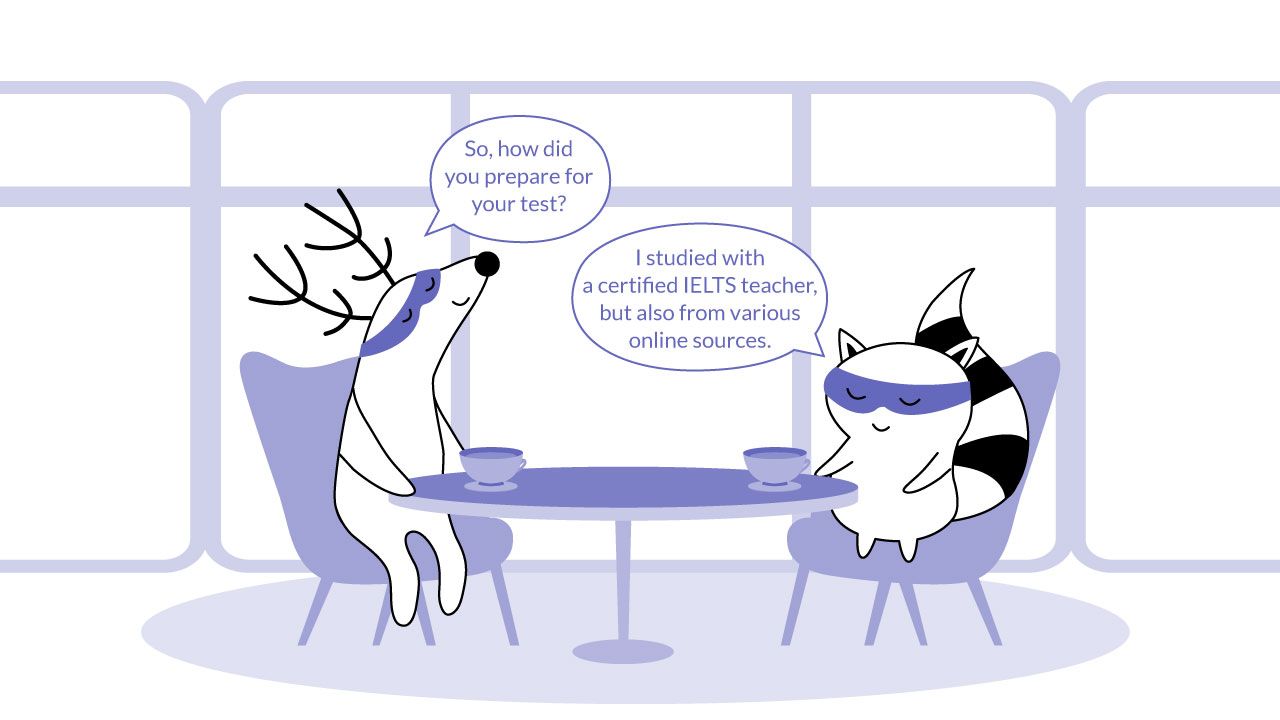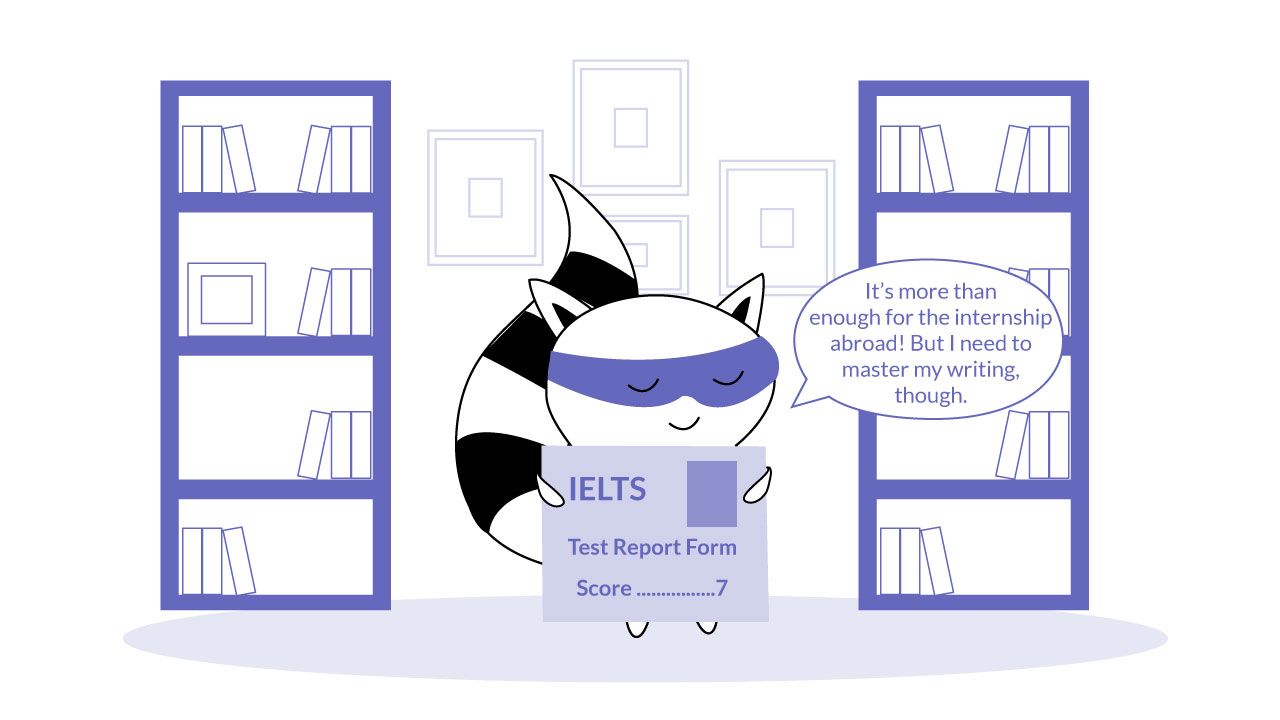
IELTS (International English Language Testing System) is one of the most popular international language tests of English as a foreign language.
This test is overseen by three influential international organizations – the British Council, IDP Education Australia, and Cambridge ESOL Examinations, making it one of the most complex English language proficiency tests.
Contrary to popular opinion, IELTS does not assess the level of language knowledge but rather determines whether a person can use the language in real life. IELTS certification increases your chances of being accepted to work or study in an English-speaking environment.
To pass the test successfully, you need to study effectively. In this post, you will find essential information about the test formats and structure and some valuable IELTS preparation tips for future test takers. Continue reading to find out everything you need to know about the IELTS test.
Learn English with Langster
IELTS Test: Overview
IELTS evaluates your level of English proficiency by testing four basic skills: listening, reading, writing, and speaking. Each skill is tested separately, but all skills are tested in one day – the duration of the test is 2 hours and 45 minutes.
IELTS assignments are designed in such a way that they reflect the language needed to communicate in everyday contexts. For example, texts in the reading section are taken from books, advertisements, scientific or business magazines, and international news. Audio recordings are real dialogues and monologues on general and specific topics, and writing assignments are typical essays or letters we may need to write in real life.
Furthermore, speaking tests are held in the form of conversations with certificated IELTS examiners, during which you get to show how well you can maintain a conversation and express your own opinion.
IELTS tests are available to book in more than 1,600 test locations in over 140 countries and territories. As of the beginning of 2022, it is also possible to register for an IELTS online test, enabling more flexibility for when and where you can take the exam.
The online test format is suitable for online Academic tests only, with all the sections taken the same way as with IELTS on a computer except for the speaking test. Online IELTS speaking test is still conducted with a human examiner via an online video call.
Types of IELTS Tests
IELTS is presented in two modules: Academic and General Training. The Academic module is suitable for people entering university courses or those who wish to continue their higher education in Britain, Canada, Australia, Ireland, New Zealand, South Africa, the United States, or other English-speaking countries.
IELTS Academic Test is also required for researchers who want to continue their career at any university in the above countries. During the exam, test takers are asked to describe tables in English, explain graphs or map fragments, or complete a flow chart.
On the other hand, the IELTS General Training test is sufficient only to move to another country and obtain a visa. General IELTS subjects are usually simpler, closer to everyday life.
Academic and General Training have the same listening and speaking tests, while in reading and writing, the Academic module is more complex. So, you need to prepare for the correct test type.
Additionally, the IELTS Partners offer an IELTS Life Skills test designed to meet the UK Visas and Immigration (UKVI) requirements for specific visa categories and other immigration purposes. The IELTS Life Skills test is equated to speaking and listening at the A1 or B1 level on the CEFR scale (Common European Framework of Reference).
When Do I Need the IELTS Test?
IELTS certification can be useful in various ways, from seeking professional registration to motivating yourself to perfect your English. So, you need this exam if:
- you are entering a foreign university,
- your employer requests the certificate,
- you are emigrating to an English-speaking country,
- you want to understand your level and identify parts that need improvement,
- you need a clear goal to learn the language.
When it comes to immigration to Great Britain, keep in mind that IELTS is the only Secure English Language Test approved by UK Visas and Immigration (UKVI) for visa customers applying both outside and inside the UK.

IELTS Test Structure
Like many international English language tests, IELTS has a strict structure that consists of four separate sections. Below, you will find a brief introduction to each part; however, it is essential to note that there is an official IELTS practice test available to take before an actual exam.
Apart from understating an IELTS test structure, practice tests provide you with an indicative overall test band score and official feedback that includes a band score for each test section. This way, you get a general idea of your current English level and the areas you need to improve.
Here is what you need to know about the main IELTS sections:
IELTS Listening Test
Your listening skills are tested first. This part lasts 30 minutes long, and it is the same for both the General Training module and the Academic module. It includes four sections:
- Part 1 - a conversation between two people on everyday topics (requesting information about prices, services, etc.).
- Part 2 - a monologue on everyday topics of a slightly higher level than in section 1 (for example, a simple presentation or speech).
- Part 3 - a conversation between several people on academic or general education topics (for example, students discussing an upcoming project).
- Part 4 - a monologue on an academic subject (for example, an excerpt from a lecture or a program on a scientific topic).
This part of the test checks how well candidates understand general ideas and specific facts and if they can recognize opinions of speakers and draw the right conclusions about the meaning of what was said.
Speakers of different accents (British, American, Canadian, and others) participate in recording tracks for the test. Conversations may include up to four people.
IELTS Reading Test
The reading test lasts 60 minutes long. To pass this part, test takers must demonstrate their ability to understand specific facts, determine the author’s opinion and attitude about the issue, recognize main ideas, contrast arguments, etc.
The texts for Academic and General Training modules differ. Tasks for the General Training module are based on excerpts from magazines, newspapers, books, instructions, letters, etc., which carry information that we often encounter in everyday life. In both versions, 40 questions are asked about three texts.
Tasks for the Academic module are based on three texts of complex design and subject matter, usually taken from popular science publications, lectures, or scientific journals but can be understood by an audience that does not have special training in a particular scientific field.
All texts and excerpts used in this part are entirely authentic, meaning that they are meant for native speakers and are not adapted for any particular level of English proficiency.
IELTS Writing Test
The third part of the test is Writing. This part takes 60 minutes, during which candidates must complete two written assignments. Tasks for Academic and General Training modules differ. The Writing section in the Academic module consists of the following tasks:
- Task 1 - a summary, description, or explanation of the information presented in a provided graph, table, chart, or diagram. You may be asked to describe and explain data, describe the stages of a process, how something works, or describe an object or event in your own words. You need to write 150 words in about 20 minutes.
- Task 2 - an essay responding to the point of view, argument, or problem. You need to write 250 words in about 40 minutes.
Responses to both tasks must be written in a formal style.
The written tasks in the General Training module are a bit easier than in the Academic module, but there are also 2 of them, and they also take 60 minutes:
- Part 1 - a letter requesting information about a given situation (e.g., renting an apartment) or explaining the situation. The letter should consist of 150 or a little more words, and it should include specific terms and expressions used to write letters.
- Part 2 - an essay in which the candidate must express their own opinion about the problem or point of view given in the assignment. You should support the ideas with evidence, and examples may be drawn from your own experience. The essay should be a minimum of 250 words.
While you might write a letter in a personal, semi-formal, or formal style, the essay can be written in a more personal style.
IELTS Speaking Test
The last part of the IELTS test is the evaluation of your spoken English. Speaking is tested after a short break following the previous three parts. It is the same for both the Academic module and the General Training module.
The speaking section takes place with a certified IELTS examiner and includes communication on various topics. Like the previous parts of the test, this one consists of several sub-sections:
- Part 1 - an interview. The candidate is asked to answer simple questions about their personality, family, hobbies, preferences, etc. This part takes 4-5 minutes.
- Part 2 - a monologue. The candidate expresses their opinion on a particular topic, and the examiner asks 1-2 questions at the end of the candidate's speech. In this part, you are given 1 minute to prepare, after which you are expected to speak up for 2 minutes.
- Part 3 - a discussion with the examiner on the topic covered in the second part. The conversation lasts about 4-5 minutes.
In all three parts, the candidate must demonstrate the ability to respond to the situation and the examiner's questions, as well as express their opinion on a wide variety of topics, from personal preferences to the current political situation in the country.

IELTS Results and Score
After passing the IELTS test, the examiners need 13 days to grade it and send the candidates their results. The results are sent in the form of a special certificate called the Test Report Form. Copies of this certificate can be sent free of charge at the candidate’s request to five more organizations (universities, corporations, etc.)
The certificate is given a score from 1 to 9 – Overall Band Score, which is the average score for all four aspects (Listening, Reading, Writing, Speaking) of the exam, as well as individual results for each of the passed parts. Here is an IELTS Band Scale:
- 9 - Expert User,
- 8 - Very Good User,
- 7 - Good User,
- 6 - Competent User,
- 5 - Modest User,
- 4 - Limited User,
- 3 - Extremely Limited User,
- 2 - Intermittent User,
- 1 - Non User,
- 0 - Did not attempt the test.
There is no passing score for the IELTS exam – the required number of points depends on your goal. If you need an IELTS certificate to study, the passing score will depend on the country, university, and the program you choose, so you need to check the minimum passing score beforehand.
The results are valid for two years after the date of the test. However, this also may vary depending on the institution or your ability to prove that you've worked to maintain your level.

IELTS Preparation Tips
When it comes to preparing for the exam, whether it's an IELTS online test or the paper-based one, you first have to decide which module you need – Academic or General. Your preparation strategy depends on this.
The next step is to understand the minimum score needed to pass the exam. The score scale varies from 0 to 9, and the passing score starts from 6 to 9 but varies greatly depending on the organization you need your certification for. Be sure to check the score that you need.
Next, you need to determine your current English proficiency level – this will help you create a clear route from point A to point B.
If you already have a good level, you can start training in English immediately. To develop tactics and skills, you can use IELTS practice tests or specially designed tutorials like IELTS Masterclass Student’s Book by Simon Haines.
However, if you feel that your current level is below your desired IELTS score, you should start by improving your language skills to the Intermediate level first. If you feel strong enough to prepare by yourself, you need to develop a detailed plan and find the right study materials.
On the other hand, working with an IELTS teacher might be more productive, as they can evaluate your level, draw up a training program, and prepare all the materials, such as IELTS speaking topics, appropriate language, and some valuable IELTS reading tips.
You can find specially designed Preparation for IELTS courses provided by the British Council, with a minimum training period of 16 weeks. For comparison, taking lessons with a university tutor or signing up for regular language-learning courses can last for a whole year.
The Bottom Line
To successfully pass IELTS, it is necessary to know the format of this test, the types of tasks you’ll be asked to do, and the strategies for their execution. In addition, you need to know all the words, phrases, and handy expressions for performing written tasks.
Your general level of vocabulary and knowledge of grammatical structures should be sufficient to understand the texts presented and competently express your thoughts in conversation with the examiner.

During the IELTS exam preparation course, you will be able to work out typical exam tasks, deal with complex topics and achieve your English language learning goals. Don't hesitate to seek additional methods to practice your IELTS skills. For instance, you can download our Langster app to read stories and to practice your English skills.
In the end, your score can increase if you spend a lot of time studying; however, only careful planning, help from specialists, and hard work will allow you to achieve this. Good luck!









